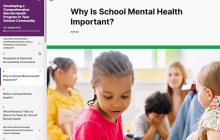The root causes of and complex factors contributing to violence are found at the individual, family, community, and societal levels. All systems and disciplines can and must play a valuable role in preventing violence, reducing harm, and mitigating the lifelong effects of violence and trauma.
Research and action in preventing violence in schools and communities includes improving the environments in which youth and young adults live and learn; implementing policies and programs that establish new norms for nonviolent behaviors; equipping individuals with competencies for positive development; and providing opportunities for education, employment, housing, mentoring, substance use treatment, and access to evidence-based mental and behavioral health services, including trauma-informed care.
To prevent repeated acts of violence, those at greatest risk of recidivism, including gang-involved individuals, require individualized guidance and support to desist from future violence and reintegrate within society if returning from a correctional setting.
Our Work
AIR applies a public health approach to violence prevention in the United States and around the world through research, evaluation, and training and technical assistance within communities and across education, justice, mental health, child protection, workforce, and housing systems.








